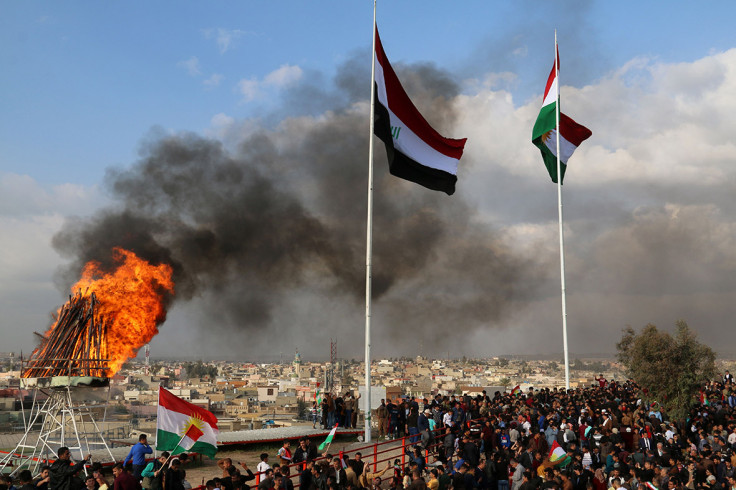Peshmerga accuses Iraqi army of advancing to retake Kirkuk from Kurd allies who held off Isis
KEY POINTS
- "Their order is to defend at any cost," says senior assistant to Iraqi Kurdistan Region President.
- Peshmerga fighters were in Kirkuk to counter Isis fighters there.
The Iraqi army has launched an operation to retake control of the city of Kirkuk, which is held by Kurdish forces, according to reports. It came as tensions are soaring in the country following an independence referendum held by the Kurdistan Regional Government (KRG) in September.
Iraqi Prime Minister Haider al-Abadi denied on 12 October that Baghdad was going to launch an attack, Reuters reported. However, AFP quoted an unnamed Kurdish general as saying: "Iraqi armed force are advancing to retake their military positions that were taken over during the events of June 2014."
Peshmerga fighters - the official army of Iraq's autonomous Kurdistan region - had advanced into Kirkuk to counter the Islamic State (Isis) terror group, which seized several areas of the country.
Hemin Hawrami, senior assistant to Iraqi Kurdistan Region President Masoud Barzani, said that Peshmerga fighters had been instructed to "defend at any cost" their positions in the city.
"Thousands of heavily armed Peshmerga units are now completely in their positions around Kirkuk. Their order is to defend at any cost," he said in a statement on Twitter. "We call upon Iraq Government to have dialogue not war. Peshmerga ordered to respond strongly for any aggression."
At least 6,000 Kurdish troops are believed to have been deployed to the oil-rich city, AP said, quoting Kurdish media. Reinforcements were sent on 12 October in response to Baghdad's alleged threats it would attack the city.
The Kurdistan Regional Security Council (KRSC) claimed that the Iraqi army and the Popular Mobilisation Forces (PMF) had been deploying tanks and heavy artillery to Bashir and Taza Khurmatu.
"These forces are approximately three kilometres (two miles) from peshmerga frontline positions,"KRSC said in a statement quoted by AFP. "Intelligence shows intention to take over nearby oil fields, airport and military base," it added.
Karwan Jamal Tahir, High Representative of the Kurdistan Regional Government to the UK, told IBTimes UK: "The KRG and the Peshmerga are being extremely cautious in their reaction to moves by the Iraqi Security Forces and the Shi'ia militia around Kirkuk.
"Any attack would needlessly build hatred between the Kurdish and Arab nations and endanger the necessary dialogue sought by the Kurdistan Region before and after the referendum. We urge all our friends from International community to encourage wisdom to prevail in Baghdad but make it clear that the Peshmerga will defend itself if attacked," Tahir said.
Thousands of heavily armed Pehsmerge units are now completely in their positions around Kirkuk.Their order is to defend at any cost. We call upon intl community to intervene, call @HaiderAlAbadi to order PMF to pull back if he can or if they listen to him. pic.twitter.com/R9g8hJJL9t
— Hemin Hawrami (@heminhawrami) October 13, 2017
On 13 October, a video surfaced of a Kurdish flag being lowered and thrown to the ground. The footage was shared by Ehab al-Khifagi, who describes himself as a member of the Iraqi special forces.
It is believed that the footage was taken near Taza Khurmatu. However, IBTimes UK has not been able to independently verify the authenticity of the video.
Security analyst and counter-terrorism expert David Otto believes it is the wrong time for such an offensive, as battles to drive Isis out of Iraq and Syria are still ongoing. "Peshmerga forces will not back down due to their fighting experience. They are extremely well armed as part of the coalition against Isis," Otto told IBTimes UK.
"The only win-win solution to resolve the tension between Baghdad and Erbil is through dialogue - without which Isis and others will see this crisis as an ideal opportunity to come back fully. This is the wrong timing as the battle to completely take out Isis in Mosul and Raqqa is still ongoing with pockets of al-Qaeda groups showing signs of regenerating in the rubble."
On 25 September, Iraqi Kurds headed to the polls to decide whether they wanted their autonomous region to be independent from the rest of the country. In spite of an overwhelming "yes" vote, the referendum is not legally binding and Kurdish authorities intend to use it to pressurise Baghdad into starting negotiations and formalise independence.
Iraq called the referendum unconstitutional and imposed an "air embargo" on Erbil, the Kurdish regional capital, and Sulaimaniyah, its second city.
Neighbouring Iran and Turkey strongly criticised the referendum and urged Kurdish officials to call it off. They fear that the referendum could spark independence sentiments among Kurdish populations in their own countries.























